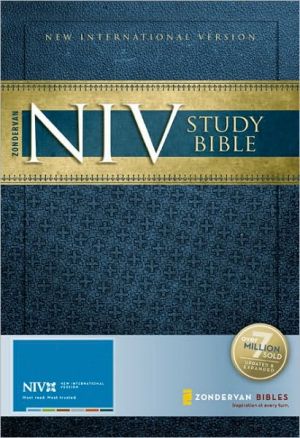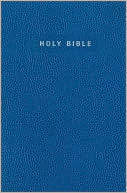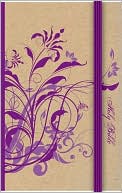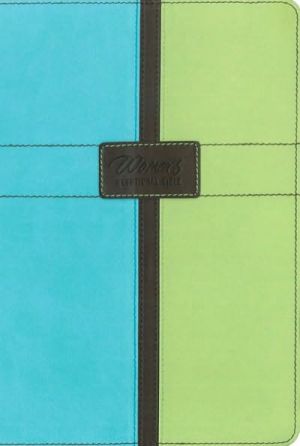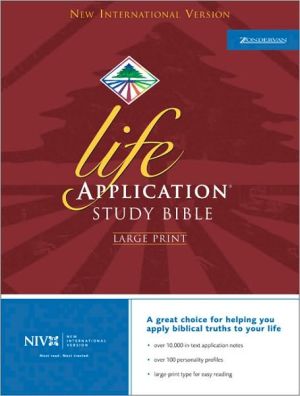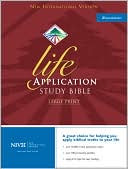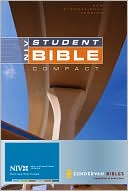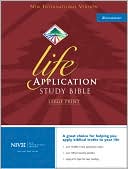Zondervan TNIV Study Bible, Personal Size
Recommended by leading evangelical scholars, pastors,\ teachers, and church leaders worldwide for its clarity, accessibility, and precision of meaning, the Zondervan TNIV Study Bible is now available in the two bestselling bonded leather colors: black and burgundy.\ Features:\ * Over 20,000 bottom-of-the-page, verse-by-verse study notes\ * Icons throughout the study notes highlight historical/\ archaeological contexts, biblical characters and people groups, and notes for personal...
Search in google:
Today's newest and brightest translation, Today's New International Version, is now available in a full-featured study edition for deeper study and biblical understanding using today's finest scholarship.
Zondervan TNIV Study Bible, Personal Size\ \ By Kenneth Barker John Stek Ron Youngblood \ Zondervan\ Copyright © 2006 The Zondervan Corporation\ All right reserved.\ ISBN: 0-310-93468-0 \ \ \ Chapter One\ MATTHEW\ INTRODUCTION\ AUTHOR\ Although the first Gospel is anonymous, the early church fathers were unanimous in holding that Matthew, one of the 12 apostles, was its author. However, the results of modern critical studies-in particular those that stress Matthew's alleged dependence on Mark for a substantial part of his Gospel-have caused some Biblical scholars to abandon Matthean authorship. Why, they ask, would Matthew, an eyewitness to the events of our Lord's life, depend so heavily on Mark's account? The best answer seems to be that he agreed with it and wanted to show that the apostolic testimony to Christ was not divided.\ Matthew, whose name means "gift of the Lord," was a tax collector who left his work to follow Jesus (9:9-13). In Mark and Luke he is called by his other name, Levi.\ DATE AND PLACE OF WRITING\ Some have argued on the basis of its Jewish characteristics that Matthew's Gospel was written in the early church period, possibly the early part of A.D. 50, when the church was largely Jewish and the gospel was preached to Jews only (Ac 11:19). However, those who have concluded that both Matthew and Luke drew extensively from Mark'sGospel date it later-after the Gospel of Mark had been in circulation for a period of time. See essay and chart, p. 1601. Accordingly, some feel that Matthew would have been written in the late 50s or in the 60s. Others, who assume that Mark was written between 65 and 70, place Matthew in the 70s or even later. However, there is insufficient evidence to be dogmatic about either view.\ The Jewish nature of Matthew's Gospel may suggest that it was written in the Holy Land, though many think it may have originated in Syrian Antioch.\ RECIPIENTS\ Since his Gospel was written in Greek, Matthew's readers were obviously Greek-speaking. They also seem to have been Jews. Many elements point to Jewish readership: Matthew's concern with fulfillment of the OT (he has more quotations from and allusions to the OT than any other NT author); his tracing of Jesus' descent from Abraham (1:1-17); his lack of explanation of Jewish customs (especially in contrast to Mark); his use of Jewish terminology (e.g., "kingdom of heaven," where "heaven" reveals the Jewish reverential reluctance to use the name of God; see note on 3:2); his emphasis on Jesus' role as "Son of David" (1:1; 9:27; 12:23; 15:22; 20:30-31; 21:9, 15; 22:41-45). This does not mean, however, that Matthew restricts his Gospel to Jews. He records the coming of the Magi (non-Jews) to worship the infant Jesus (2:1-12), as well as Jesus' statement that the "field is the world" (13:38). He also gives a full statement of the Great Commission (28:18-20). These passages show that, although Matthew's Gospel is Jewish, it has a universal outlook.\ PURPOSE\ Matthew's main purpose is to prove to his Jewish readers that Jesus is their Messiah. He does this primarily by showing how Jesus in his life and ministry fulfilled the OT Scriptures. Although all the Gospel writers quote the OT, Matthew includes nine proof texts unique to his Gospel (1:22-23; 2:15; 2:17-18; 2:23; 4:14-16; 8:17; 12:17-21; 13:35; 27:9-10) to drive home his basic theme: Jesus is the fulfillment of the OT predictions of the Messiah. Matthew even finds the history of God's people in the OT recapitulated in some aspects of Jesus' life (see, e.g., his quotation of Hos 11:1 in 2:15). To accomplish his purpose Matthew also emphasizes Jesus' Davidic lineage (see Recipients, p. 1603).\ STRUCTURE\ The way the material is arranged reveals an artistic touch. The whole Gospel is woven around five great discourses: (1) chs. 5-7; (2) ch. 10; (3) ch. 13; (4) ch. 18; (5) chs. 24-25. That this is deliberate is clear from the refrain that concludes each discourse: "When Jesus had finished saying these things," or similar words (7:28; 11:1; 13:53; 19:1; 26:1). The narrative sections, in each case, appropriately lead up to the discourses. The Gospel has a fitting prologue (chs. 1-2) and a challenging epilogue (28:16-20).\ The fivefold division may suggest that Matthew has modeled his book on the structure of the Pentateuch (the first five books of the OT). He may also be presenting the gospel as a new Torah and Jesus as a new and greater Moses.\ OUTLINE\ I. The Birth and Early Years of Jesus (chs. 1-2) A. His Genealogy (1:1-17) B. His Birth (1:18-2:12) C. His Stay in Egypt (2:13-23)\ II. The Beginnings of Jesus' Ministry (3:1-4:11) A. His Forerunner (3:1-12) B. His Baptism (3:13-17) C. His Temptation (4:1-11)\ III. Jesus' Ministry in Galilee (4:12-14:12) A. The Beginning of the Galilean Campaign (4:12-25) B. The Sermon on the Mount (chs. 5-7) C. A Collection of Miracles (chs. 8-9) D. The Commissioning of the 12 Apostles (ch. 10) E. Ministry throughout Galilee (chs. 11-12) F. The Parables of the Kingdom (ch. 13) G. Herod's Reaction to Jesus' Ministry (14:1-12)\ IV. Jesus' Withdrawals from Galilee (14:13-17:20) A. To the Eastern Shore of the Sea of Galilee (14:13-15:20) B. To Phoenicia (15:21-28) C. To the Decapolis (15:29-16:12) D. To Caesarea Philippi (16:13-17:20)\ V. Jesus' Last Ministry in Galilee (17:22-18:35) A. Prediction of Jesus' Death (17:22-23) B. Temple Tax (17:24-27) C. Discourse on Life in the Kingdom (ch. 18)\ VI. Jesus' Ministry in Judea and Perea (chs. 19-20) A. Teaching concerning Divorce (19:1-12) B. Teaching concerning Little Children (19:13-15) C. The Rich Young Man (19:16-30) D. The Parable of the Workers in the Vineyard (20:1-16) E. Prediction of Jesus' Death (20:17-19) F. A Mother's Request (20:20-28) G. Restoration of Sight at Jericho (20:29-34)\ VII. Passion Week (chs. 21-27) A. The Entry of Jesus into Jerusalem as King (21:1-11) B. The Clearing of the Temple (21:12-17) C. The Last Controversies with the Jewish Leaders (21:18-23:39) D. The Olivet Discourse (chs. 24-25) E. The Anointing of Jesus' Feet (26:1-13) F. The Arrest, Trials and Death of Jesus (26:14-27:66)\ VIII. The Resurrection (ch. 28) A. The Earthquake and the Angel's Announcement (28:1-7) B. Jesus' Encounter with the Women (28:8-10) C. The Guards' Report and the Jewish Elders' Bribe (28:11-15) D. The Great Commission (28:16-20)\ THE GENEALOGY OF JESUS THE MESSIAH\ 1:1-17pp - Lk 3:23-38 1:3-6pp - Ru 4:18-22 1:7-11pp - 1Ch 3:10-17\ 1 This is the genealogy of Jesus the Messiah the son of David, the son of Abraham:\ 2 Abraham was the father of Isaac, Isaac the father of Jacob, Jacob the father of Judah and his brothers, 3 Judah the father of Perez and Zerah, whose mother was Tamar, Perez the father of Hezron, Hezron the father of Ram, 4 Ram the father of Amminadab, Amminadab the father of Nahshon, Nahshon the father of Salmon, 5 Salmon the father of Boaz, whose mother was Rahab, Boaz the father of Obed, whose mother was Ruth, Obed the father of Jesse, 6 and Jesse the father of King David.\ David was the father of Solomon, whose mother had been Uriah's wife,\ 7 Solomon the father of Rehoboam, Rehoboam the father of Abijah, Abijah the father of Asa, 8 Asa the father of Jehoshaphat, Jehoshaphat the father of Jehoram, Jehoram the father of Uzziah, 9 Uzziah the father of Jotham, Jotham the father of Ahaz, Ahaz the father of Hezekiah, 10 Hezekiah the father of Manasseh, Manasseh the father of Amon, Amon the father of Josiah, 11 and Josiah the father of Jeconiah and his brothers at the time of the exile to Babylon. 12 After the exile to Babylon: Jeconiah was the father of Shealtiel, Shealtiel the father of Zerubbabel, 13 Zerubbabel the father of Abiud, Abiud the father of Eliakim, Eliakim the father of Azor, 14 Azor the father of Zadok, Zadok the father of Akim, Akim the father of Eliud, 15 Eliud the father of Eleazar, Eleazar the father of Matthan, Matthan the father of Jacob, 16 and Jacob the father of Joseph, the husband of Mary, and Mary was the mother of Jesus who is called the Messiah.\ 17 Thus there were fourteen generations in all from Abraham to David, fourteen from David to the exile to Babylon, and fourteen from the exile to the Messiah.\ JOSEPH ACCEPTS JESUS AS HIS SON\ 18 This is how the birth of Jesus the Messiah came about: His mother Mary was pledged to be married to Joseph, but before they came together, she was found to be pregnant through the Holy Spirit. 19 Because Joseph her husband was a righteous man and did not want to expose her to public disgrace, he had in mind to divorce her quietly.\ 20 But after he had considered this, an angel of the Lord appeared to him in a dreams and said, "Joseph son of David, do not be afraid to take Mary home as your wife, because what is conceived in her is from the Holy Spirit. 21 She will give birth to a son, and you are give him the name Jesus, because he will save his people from their sins."\ 22 All this took place to fulfill what the Lord had said through the prophet: 23 "The virgin will conceive and give birth to a son, and they will call him Immanuel" (which means "God with us").\ 24 When Joseph woke up, he did what the angel of the Lord had commanded him and took Mary home as his wife. 25 But he had no union with her until she gave birth to a son. And he gave him the name Jesus.\ THE MAGI VISIT THE MESSIAH\ 2 After Jesus was born in Bethlehem in Judea, during the time of King Herod, Magi from the east came to Jerusalem 2 and asked, "Where is the one who has been born king of the Jews? We saw his star when it rose and have come to worship him."\ 3 When King Herod heard this he was disturbed, and all Jerusalem with him. 4 When he had called together all the people's chief priests and teachers of the law, he asked them where the Messiah was to be born. 5 "In Bethlehem in Judea," they replied, "for this is what the prophet has written:\ 6 "'But you, Bethlehem, in the land of Judah, are by no means least among the rulers of Judah; for out of you will come a ruler who will shepherd my people Israel.'"\ 7 Then Herod called the Magi secretly and found out from them the exact time the star had appeared. 8 He sent them to Bethlehem and said, "Go and make a careful search for the child. As soon as you find him, report to me, so that I too may go and worship him."\ 9 After they had heard the king, they went on their way, and the star they had seen when it rose went ahead of them until it stopped over the place where the child was. 10 When they saw the star, they were overjoyed. 11 On coming to the house, they saw the child with his mother Mary, and they bowed down and worshiped him. Then they opened their treasures and presented him with gifts of gold, frankincense and myrrh. 12 And having been warned in a dream not to go back to Herod, they returned to their country by another route.\ THE ESCAPE TO EGYPT\ 13 When they had gone, an angel of the Lord appeared to Joseph in a dream. "Get up," he said, "take the child and his mother and escape to Egypt. Stay there until I tell you, for Herod is going to search for the child to kill him."\ 14 So he got up, took the child and his mother during the night and left for Egypt, 15 where he stayed until the death of Herod. And so was fulfilled what the Lord had said through the prophet: "Out of Egypt I called my son."\ 16 When Herod realized that he had been outwitted by the Magi, he was furious, and he gave orders to kill all the boys in Bethlehem and its vicinity who were two years old and under, in accordance with the time he had learned from the Magi. 17 Then what was said through the prophet Jeremiah was fulfilled:\ 18 "A voice is heard in Ramah, weeping and great mourning, Rachel weeping for her children and refusing to be comforted, because they are no more."\ THE RETURN TO NAZARETH\ 19 After Herod died, an angel of the Lord appeared in a dream to Joseph in Egypt 20 and said, "Get up, take the child and his mother and go to the land of Israel, for those who were trying to take the child's life are dead."\ 21 So he got up, took the child and his mother and went to the land of Israel. 22 But when he heard that Archelaus was reigning in Judea in place of his father Herod, he was afraid to go there. Having been warned in a dream, he withdrew to the district of Galilee, 23 and he went and lived in a town called Nazareth. So was fulfilled what was said through the prophets: "He will be called a Nazarene."\ JOHN THE BAPTIST PREPARES THE WAY\ 3:1-12pp - Mk 1:3-8; Lk 3:2-17\ 3 In those days John the Baptist came, preaching in the wilderness of Judea 2 and saying, "Repent, for the kingdom of heaven has come near." 3 This is he who was spoken of through the prophet Isaiah:\ "A voice of one calling in the wilderness, 'Prepare the way for the Lord, make straight paths for him.'"\ 4 John's clothes were made of camel's hair, and he had a leather belt around his waist. His food was locusts and wild honey. 5 People went out to him from Jerusalem and all Judea and the whole region of the Jordan. 6 Confessing their sins, they were baptized by him in the Jordan River.\ 7 But when he saw many of the Pharisees and Sadducees coming to where he was baptizing, he said to them: "You brood of vipers! Who warned you to flee from the coming wrath? 8 Produce fruit in keeping with repentance. 9 And do not think you can say to yourselves, 'We have Abraham as our father.' I tell you that out of these stones God can raise up children for Abraham. 10 The ax is already at the root of the trees, and every tree that does not produce good fruit will be cut down and thrown into the fire.\ 11 "I baptize you with water for repentance. But after me comes one who is more powerful than I, whose sandals I am not worthy to carry. He will baptize you with the Holy Spirit and fire. 12 His winnowing fork is in his hand, and he will clear his threshing floor, gathering his wheat into the barn and burning up the chaff with unquenchable fire."\ THE BAPTISM OF JESUS\ 3:13-17pp - Mk 1:9-11; Lk 3:21,22; Jn 1:31-34\ 13 Then Jesus came from Galilee to the Jordan to be baptized by John. 14 But John tried to deter him, saying, "I need to be baptized by you, and do you come to me?"\ 15 Jesus replied, "Let it be so now; it is proper for us to do this to fulfill all righteousness." Then John consented.\ 16 As soon as Jesus was baptized, he went up out of the water. At that moment heaven was opened, and he saw the Spirit of God descending like a dove and alighting on him. 17 And a voice from heavens said, "This is my Son, whom I love; with him I am well pleased."\ JESUS IS TESTED IN THE WILDERNESS\ 4:1-11pp - Mk 1:12,13; Lk 4:1-13\ 4 Then Jesus was led by the Spirit into the wilderness to be tempted by the devil. 2 After fasting forty days and forty nights, he was hungry. 3 The tempter came to him and said, "If you are the Son of God, tell these stones to become bread."\ 4 Jesus answered, "It is written: 'People do not live on bread alone, but on every word that comes from the mouth of God.'"\ 5 Then the devil took him to the holy city and had him stand on the highest point of the temple. 6 "If you are the Son of God," he said, "throw yourself down. For it is written:\ "'He will command his angels concerning you, and they will lift you up in their hands, so that you will not strike your foot against a stone.'"\ (Continues...)\ \ \ \ \ Excerpted from Zondervan TNIV Study Bible, Personal Size by Kenneth Barker John Stek Ron Youngblood Copyright © 2006 by The Zondervan Corporation. Excerpted by permission.\ All rights reserved. No part of this excerpt may be reproduced or reprinted without permission in writing from the publisher.\ Excerpts are provided by Dial-A-Book Inc. solely for the personal use of visitors to this web site. \ \

